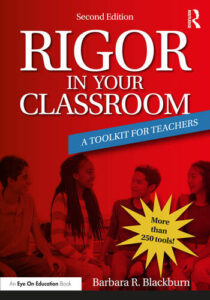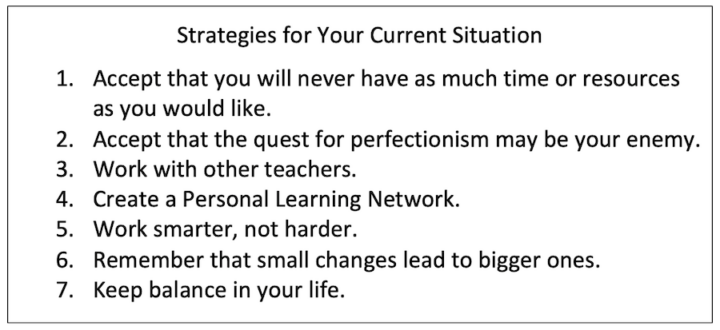Feeling Overwhelmed? Try These 7 Strategies
By Barbara R. Blackburn
The number one frustration I hear from teachers is TIME! So often they say “I just don’t have time to do everything I need to.”
I have seven suggestions that may help.
Strategy 1: Accept that you will never have as much time or resources as you would like. I continue to find that, no matter how much I have to do, I always need more time. I told a friend once that I wished I had 48 hours per day. She replied, if that happened, you would end up with double the work!
I find inspiration from Maya Angelou: If you don’t like something, change it. If you can’t change it, change your attitude. Don’t complain.
Strategy 2: Accept that the quest for perfectionism may be your enemy. I have realized that there are times my expectations for myself are too high and are unrealistic. I’ve also found that to be true with many teachers. They spend hours on the internet looking ideas to create the perfect lesson plan, when they probably could have accomplished just as much if they had gotten on with the primary task much earlier.
I’m not recommending you provide sloppy instruction. What I am saying is that most of the time, 80% of excellence is still very, very good. If it takes you double or triple the time to gain that additional 20%, it’s probably not worth it because of all the other tasks you didn’t accomplish.
Strategy 3: Work with other teachers. Although it takes time to meet with other teachers to plan together, in the long run, it saves time. Let’s say that you have an upcoming unit in a history class that includes reading a primary source that is likely to be challenging for some students. You need a support tool for struggling students, and that will be needed multiple times during the year.

Strategy 4: Create a Personal Learning Network. Sometimes you and your colleagues will need other ideas. I spoke with a teacher who waited until the last minute to plan lessons, then frantically googled for ideas. If you have ever done that, you know that you have to filter through a lot of mediocre ideas before you find ones you like.
Instead, consider creating your own Personal Learning Network (PLN). It’s a way of using the Internet and social media to manage your own learning and to organize the information you receive. PLNs are not new. Often, they are just networks of professional contacts, but with social media it’s possible to add experts and colleagues from around the world to your network.
Strategy 5: Work smarter, not harder. You’ve probably heard this before, but it is true. Far too often we spend extra time on our work because we can’t find something we need, or we don’t remember something we wanted to change this year. It is absolutely critical to stay organized so that we streamline what we do.
Find or create an organizational system that will help you manage all your tasks. There are technology-based options as well as paper ones. I find it particularly helpful to have strategies to document changes I want to make when I teach a lesson next year, collect resources I want to use, and keep up with recurring tasks, such as a weekly email to parents.
When I was a classroom teacher, I addressed the first option by writing notes on my plans. The problem was that I wasn’t organized enough to find all my notes when I needed them. Now to keep up with resources I want to use in the future, I use folders for organization.

In terms of recurring tasks, I currently use a to-do list app that allows me to check a box if a task occurs regularly so that the app automatically schedules it (for example, on the last day of the month). A friend of mine, Frank Buck, provides practical ideas and resources on organization and time management, especially using technology, on his website: www.frankbuck.org.
Strategy 6: Remember that small changes lead to bigger ones. Far too often we think that if we are implementing something new, we need to change everything we are doing. If you remember the old fable, the deliberate turtle finished the race before the disorganized hare. Start slowly, implementing an idea or two at a time, rather than throwing out everything you are doing and starting over again and again. Begin with two tiers one day each week, then increase them over time. Regular progress is the goal.
Strategy 7: Keep balance in your life. As you are creating a rigorous, differentiated classroom, you will likely become overwhelmed, tired, and discouraged at times. If you want to make a difference with your students, don’t work so much that you don’t have time for yourself and your family.
Set a time to leave at the end of the day and stick to it unless there is an emergency. If you need to take work home at night or on the weekend, set a limit of how long you will work. Do your job effectively but make time for yourself. When you realize you’re not doing your best, go for a walk. Chat with a friend. Break.
End Note
When you feel overwhelmed, try one or more of these seven strategies. And don’t forget my most important tip: You will never have enough time to do everything, so do your best and leave the rest!
Feature image by Mohamed Hasan
Folder image by Rosy from Pixabay

































